
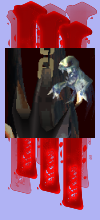




Capcom rebooted the Ghosts 'N Goblins series with Maximo, and revitalized the series with Ultimate Ghosts 'N Goblins. Both incorporated looser control and new abilities like cliff-grabbing and special attacks that gave the player more leeway than the older titles. Not that it made the series any easier, but it sure made it more approachable. In fact, the Maximo sequel was so good that it made Capcom's cancellation of Maximo 3 one of the biggest travesties in modern video games. Fast-forward to the dawn of the iOS. Capcom had plans for it, but I don't ever remember them saying anything about bringing their most iconic IPs to it.
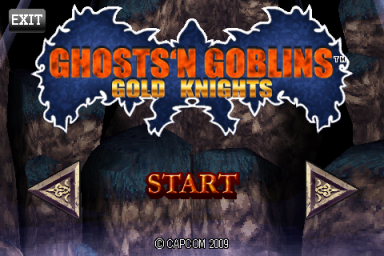 |
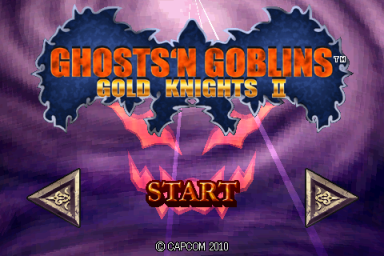 |
I never liked Apple products; from the Apple IIe and Macintosh to the iMac and iPod, I just never liked them. I was even wary of the iPhone when it came out, carefully looking at every aspect of it. Opportunity knocked, at the whim of an exceptional woman, and I had a chance to get it. I wasn't going to get it just for the music or phone features; there had to be more to warrant a purchase. Then it hit me that Capcom was pushing iPhone titles some time back, so I researched a little and found that some of Capcom's most iconic IPs were among them. Buying it was actually more involved than buying a vehicle, but it was worth it because I found that Capcom made a new Ghosts 'N Goblins for it! Hot on the heels of the Japan-only Kai edition of Ultimate Ghouls 'N Ghosts, but made on the iOS, for the iOS, from the ground up!
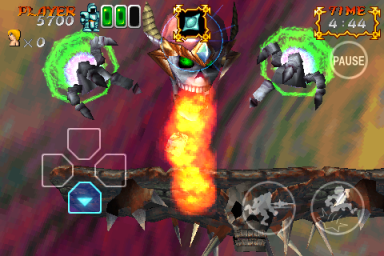 |
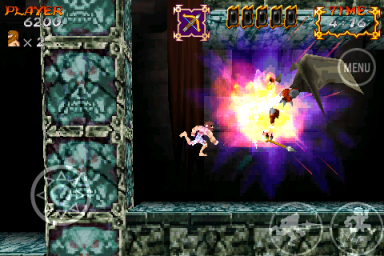 |
It was the first app I downloaded, and still one of the best. Instead of playing it right away, I saved it for my long train rides and I was thankful I did. I had to cover work for some hung-over idiot all the way out in Futt-Buck Egypt, and the only thing worse than that is the train ride back. I can still remember the bitter cold and how thankful I was when the train finally arrived; the heated seats were instant relief as my body thawed. Ghosts 'N Goblins - Gold Knights made that long-ass ride go a lot quicker, and without it I would have lost my mind. And it really did span the whole ride; even dying a billion times, I still beat the whole game that day! Even after going through the game, though, there's still much more to Ghosts 'N Goblins Gold Knights and its sequel. Ghosts 'N Goblins - Gold Knights and its sequel are both great; not quite the masterpiece Maximo - Army Of Zin was, but better-executed than Ultimate Ghosts 'N Goblins. That doesn't detract from everything these two games are, though. Even with the prequel/sequel relationship, the two are still surprisingly different from each other. Having one means you must have the other to experience it in its entirety.
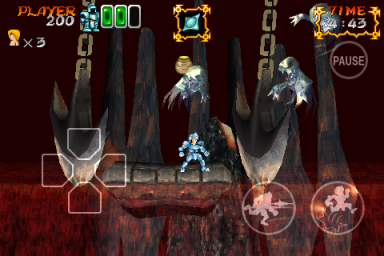 |
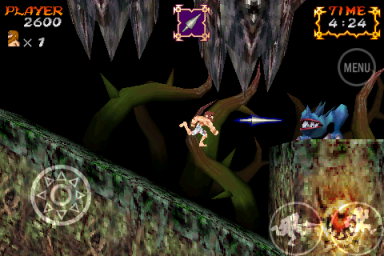 |
(Un)Separated
At Birth
Even with the "updated" Ultimate Ghosts 'N Goblins Kai,
the problem was that the game was still tough to pick up. It was
hard to enjoy all the cool stuff they worked so hard to put in the game
because they made so much of the game based on the rigidness of old. Maximo
- Army Of Zin was designed well, and ultimately a testament to series
progression. It controlled smoother than Maximo and its predecessors,
and showed that the series could stay relevant even without the enraging
difficulty that defined it. The nostalgic platforming was still a challenge,
but it was more forgiving and within bounds (control was no longer a valid
excuse for failure). It wasn't broke, but Capcom attempted to fix it in
Ultimate Ghosts 'N Goblins with unforgiving platforming and reverting
back to difficult control. Didn't they see that Maximo - Army Of Zin
controlled like a dream?!
Even with a newly-added ability to grab onto and hang from cliffs, so many parts of the game were ridiculous and barely fair; Ghosts 'N Goblins - Gold Knights and its sequel aren't like that, though. With its touch-based controls, Ghosts 'N Goblins - Gold Knights and its sequel control better than the original Maximo and Ultimate Ghosts 'N Goblins both! I rarely fail the platforming parts, and I know it's my fault when I actually do. Lancelot can even Mario-jump enemies in Ghosts 'N Goblins - Gold Knights! It's the perfect addition to make the game more approachable, but the ability sadly didn't make it to Ghosts 'N Goblins - Gold Knights II. With great control similar to Maximo - Army Of Zin, and visual similarities with Ultimate Ghosts 'N Goblins, the Ghosts 'N Goblins - Gold Knights and its sequel feel essentially like a hybrid.
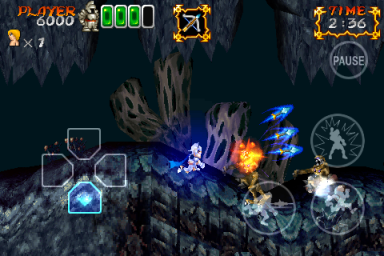 |
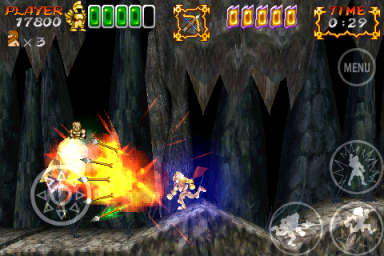 |
It felt like Arthur did almost nothing in previous GNG entries. Even with upgraded armor to make him stronger, it was like he was hamstrung by some sort of uncontrollable weakness. The charm of Maximo - Army Of Zin lied in how much damage you could do. You didn't just feel like you were doing a ton of damage; you saw it in explosions all around you as enemies fell helplessly to your immense firepower. Trails of dropped power-ups from the fallen were a testament to that power. Ultimate Ghosts 'N Goblins (and its supposedly easier upgrade) had the armor upgrade system, too, but it seems to better even out the odds in Ghosts 'N Goblins - Gold Knights and its sequel. There's nothing quite like anticipating armor upgrades, then drenching enemies in a hail of arrows when you finally do get it. There's a plethora of ways you leave chaos in your wake with all the different weapon upgrades, and that's not even counting the age-old charge attack from previous GNG entries! It's back again, and it's devastating as ever, stopping enemies dead in their tracks. Determined by character armor and weapon upgrades, these attacks release a violent display of destructive, screen-filling pyrotechnics from lightning storms and energy starbursts to boomerang volleys, fire storms, and even dragons.
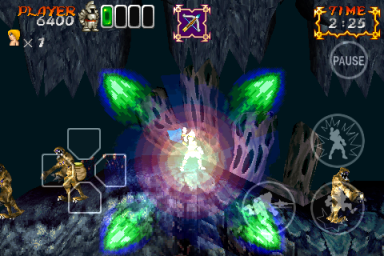 |
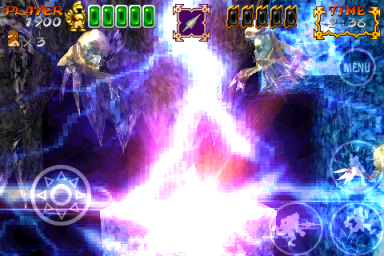 |
Knights
Of The Round
Those features (though varied) are in both Ghosts 'N Goblins - Gold
Knights and Ghosts 'N Goblins - Gold Knights II, but the most
noticeable thing of each title is different playable characters, stages,
bosses, and endings. There are even weapon variations for each of the
three characters (axes, crossbows, etc)! Ghosts 'N Goblins - Gold Knights
started out with the familiar Arthur, adding the handsome Lancelot
as an alternate. If I'm not mistaken, this marked not only the return
of Lancelot since Capcom's own 16-Bit masterpiece, Knights Of The Round,
but also the first alternate playable character in the Ghosts 'N Goblins
series. Enjoy Lancelot's easily-approachable, Mario head-jumping antics
in GNGGK, though, because he was replaced by the unfortunate-looking
Percival in GNGGKII.
Capcom followed Lancelot's general rendition from Knights Of The Round, but with Ghosts 'N Goblins - Gold Knights II they dropped the ball; Percival just doesn't look cool anymore, and his in-close fighting "abilities" don't really benefit him or make him fun to use like jumping flexibility did for Lancelot. They tried to give his sword attacks some benefits with splash damage and fireballs, but they're still basically Arthur's sword attacks from the older games. GNGGKII is probably the bigger, more epic game of the two, having improved upon GNGGK in every aspect, but Percival should have been in the first entry and then Lancelot saved for the second. Don't get me wrong, both games are absolute must-haves, and everyone has different taste, but I thought Lancelot was cooler all-around than Percival.
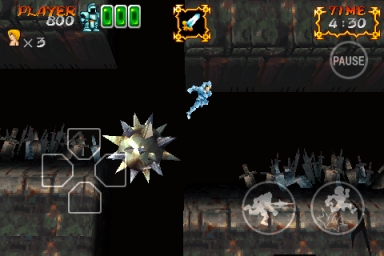 |
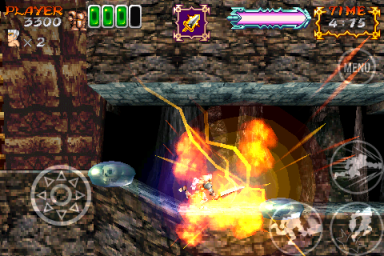 |
Despite its name, GNGGKII is easily mistaken for a mere upgrade of GNGGK, even though it's actually a full-on sequel. GNGGKII picks up directly where GNGGK left off, and each game has a unique enemy cast in addition to unique heroes. Save for common enemies like zombies and ghosts, there's hardly any overlapping. Different enemies and bosses inhabit each game's unique locales, and it's especially noticeable when you play the titles in order. New abominations are everywhere, and a good example is the hulking lizard warriors in GNGGKII who replace the beefy wolfmen in GNGGK. Even bosses were replaced in GNGGKII from GNGGK, and the proof really is in the order; a cyclops replaces the gargoyle, a rampaging monster replaces the giant bug, a floating bladed eyeball monstrosity replaces the rolling centipede, the demon lord replaces the skull helmet boss, a mysterious dark knight replaces the demon lord, and a dark knight monster replaces the demon throne endboss. Different, familiar versions of usual suspects "Red Areemer" and the Demon Lord round-out the Halloween-themed cast.
Enemies are so profoundly-detailed that they range from surprisingly freaky to downright disturbing. The best example of this is the bladed eyeball boss. As if the pulsating and rotating blades weren't bad-enough already, the eyeball looks disturbingly alive and real. It must be seen to be believed. The giant, hideous insect bosses are a close second because they look so disgusting. Though less detailed, GNGGK series bosses are actually more menacing and intimidating than ones from the UGNG series; some of them are so huge that they fill most of the screen with just their head! I haven't seen production this good in the series since MAOZ. The surprise of new threats awaiting in each stage really keeps you on guard and in the game. It's hard to get bored when you have no idea what's going to come out at you next, and both GNGGK titles do well at scaring.
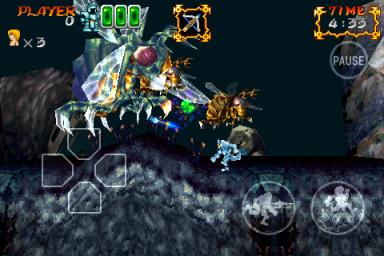 |
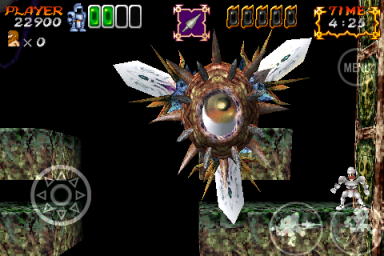 |
Detailing
A Nightmare
And it's masterful craft
across both games that scare, and really showcase the graphics capabilities
of the iOS. The visuals are like higher-resolution PlayStation-era titles
with added lighting and effects; had Capcom made a 32-Bit entry of this
series back then, it'd probably look like this. Who knows? Maybe parts
of these titles were salvaged remains of the canceled Nintendo 64 game.
While not quite as visually-stunning as Maximo - Army Of Zin or
Ultimate Ghosts 'N Goblins Kai, there is an incredible amount of
detail in both Ghosts 'N Goblins - Gold Knights titles. Where MOAZ
and UGNGK showcased a wide variety of lush, brilliant environments
across every end of the spectrum, GNGGK and its sequel depict a
darker, more sinister variety of locales that bring the nightmarish enemies
and bosses to life in frightening fashion.
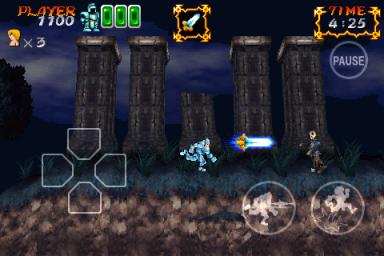 |
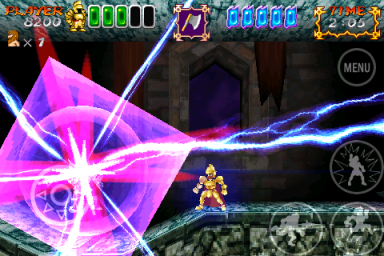 |
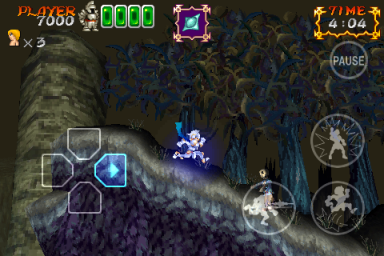 |
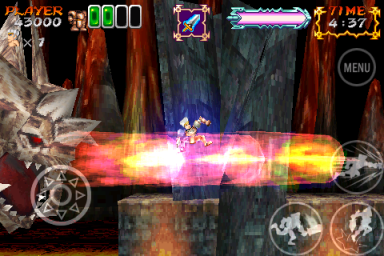 |
Of course, all of that detail wouldn't be much without equally impressive special effects to compliment it, and both games display tons of splashy fireworks in marvelous Capcom fashion. Enemies violently explode into pieces, foliage springs to life, waterfalls rage, and fireballs blaze out of control. Charge-attacks display a variety of screen-filling pyrotechnics ranging from slithering translucent dragons and brilliant starbursts, to mesmerizing vortexes and blinding lightning. And the cool thing is that charge attacks actually look different in both games, so you see different effects for each type in each title. These special effects even cast light on surrounding enemies! I really haven't seen any other game on the iOS as flashy, brilliant, and full of character as GNGGK or its sequel. There are hiccups when you combine all these special effects with humungous bosses, chaotic backgrounds, and destructible environments, but its not constant and both games still run fine. If these two games aren't an accurate demonstration of what the iPod Touch/iPhone/iPad is capable of, then I don't know what is!
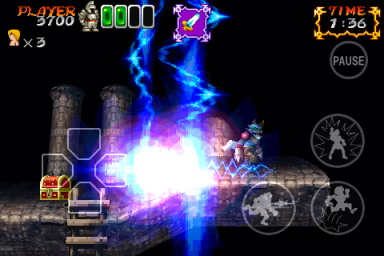 |
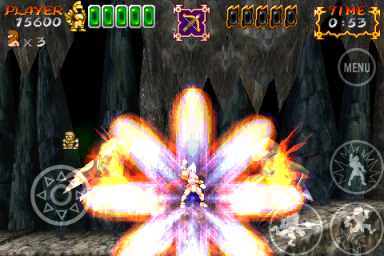 |
Topping-off the detailed models and splashy special effects is Capcom's signature touch of smooth, fluid animation. Playable heroes, enemies, and bosses alike animate appropriately; zombies shuffle, lizard men salivate, fishmen lumber, insects slither, wolfmen sneer, and a host of other monsters display razor-sharp teeth. Together with the audio and moody environmental details, the animation breathes life into the Halloween theme the series is known for. Adding to all that are the effects and animation used in the cinematic sequences, too (which are even better in the sequel)!
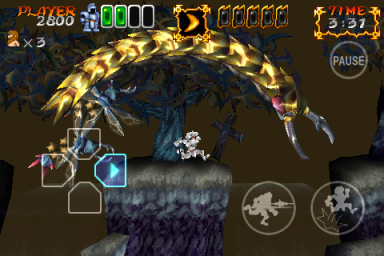 |
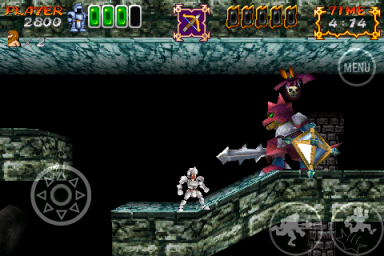 |
The
Sounds Of Horror
Seeing as how Apple hardware is designed with particular emphasis on music,
it's no surprise that both versions of GNGGK couldn't sound better.
This aspect is level with UGNG. From the title screen to the very
end, GNGGK and its sequel sound just as they should (epic and scary).
Rotten retro sound effects compliment a rotten cast of enemies and Halloween-themed
locales rounded-out by a beautifully-orchestrated score that brings it
all to life. Familiar tunes bring back memories of the old 8-Bit Ghosts
'N Goblins and the 16-Bit entries Ghouls 'N Ghosts and Super
Ghouls 'N Ghosts; the first stage of GNGGK will bring fans
back to the days of 16-Bit frustration. Hearing the map screen in both
games will plunge you back into the excruciating difficulty of Ghosts
'N Goblins (one of the toughest NES games ever). Both games
evoke memories of past entries in the series, and audio plays a big part
in the process.
 |
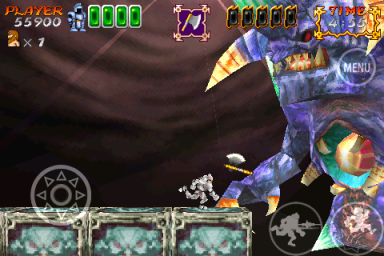 |
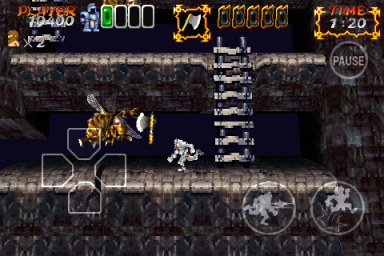 |
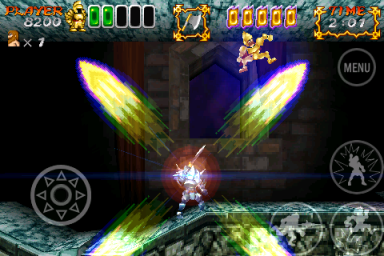 |
The GNGGK entries are a return to the series' humble roots, but without everything that left Arthur hamstrung in the past. Yes, even moreso than the UGNG entries (which many considered to be a return to form when it came out). Simplicity is the reason why. The UGNG entries complicated simplicity with modern equipment concepts from Maximo, then offset it with control concepts of old. The GNGGK entries stayed simple and took the best elements from both by complimenting the old armor upgrade system with the user-friendly control of Maximo - Army Of Zin. Contrary to the thought that touch controls cannot be well-executed, I thought both GNGGK and its sequel controlled as well as MAOZ did, and even better than the rest of the series. I can see why so many fans consider UGNG to be the best in the series (great visuals, deep stages, equipment depth), but I like GNGGK and its sequel more because they're actually fun. After all, that's what video games are all about, right? If you're not a fan of past entries, these two may actually appeal more simply because the learning curve isn't as high. GNGGK and its sequel are, by far, the best iOS games out, period. Titles like this arguably make the iPod Touch/iPhone/iPad a game machine. With games like these, how can it not be considered a legitimate game machine?
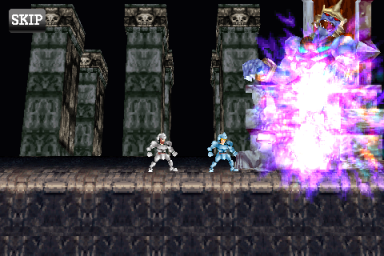 |
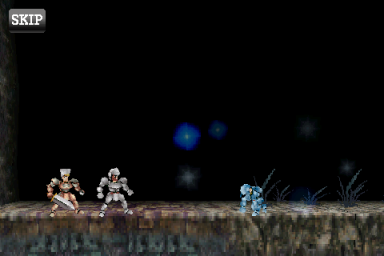 |